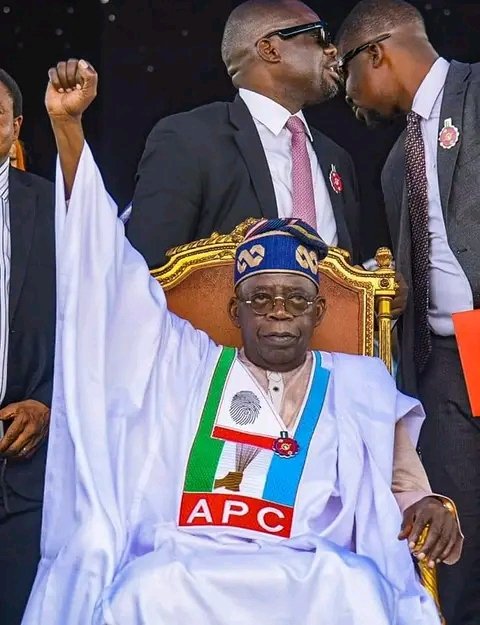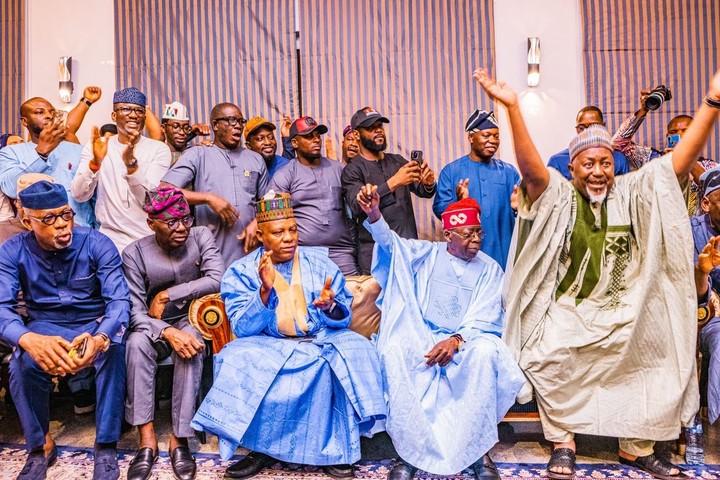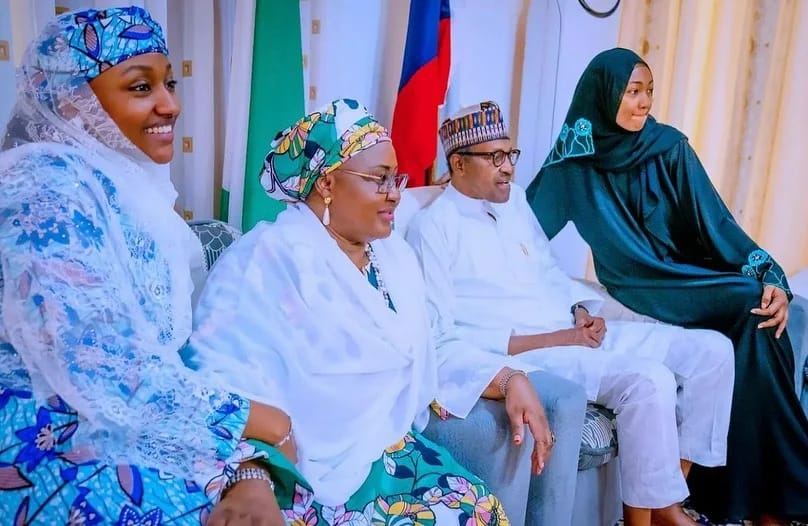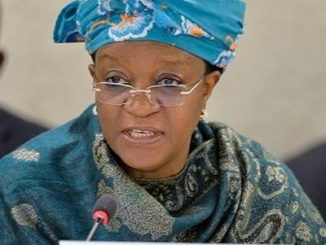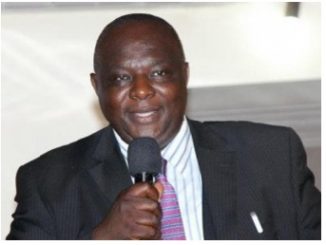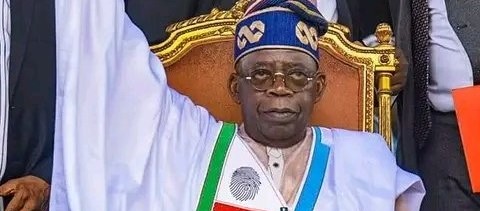
Bola Ahmed Tinubu has been declared as the winner of Nigeria’s presidential elections, beating out two other prominent candidates. It comes three days after criticism by observers for widespread logistical failings, violence that suppressed the vote and cries from opposition parties of a sham.
BOLA TINUBU AFTER HIS VICTORY WAS ANNOUNCED
For Tinubu, his victory is the culmination of a deeply held ambition.
Over decades, the former two-term governor of Lagos has evolved into a divisive yet towering figure in Nigerian politics. The wealthy, so-called political godfather is a power broker who helped outgoing president Muhammadu Buhari win the presidency in 2015.
Tinubu’s campaign slogan was “emi lo kan” in his native Yoruba — “It’s my turn.” And now it is.
THE MOMENT THE RESULT WAS ANNOUNCED–TINUBU SECOND FROM RIGHT
He won just over 36% of the vote in one of the most tightly contested polls since the end of military rule. He lost in his home state but won by a clear margin in the rest of the country defeating 76-year-old Atiku Abubakar, a six–time presidential contestant, and 61-year-old Peter Obi, a third–party candidate who galvanized huge support from voters disaffected with the traditional political class.
Tinubu is at once one of the most well-known politicians in the country and also an enigma, dogged by questions about the source of his wealth, his age and his health.
A former accountant and senator, he’s credited by supporters for attracting major investment and turning Lagos into one of the biggest economies in Africa when he was governor of the state from 1999 to 2007.
PRESIDENT BUHARI AND FAMILY LISTEN TO THE ANNOUNCEMENT
Since he left office, subsequent governors have relied on his blessing and committed to following his blueprint.
But to his detractors, he is blamed for Lagos’ many challenges: decrepit infrastructure, a lack of affordable housing and inequality. He has long claimed to have made millions while working as an accountant at Deloitte, but the firm says he was never employed.
He has often been accused of maintaining control of the state’s finances which he helped to build. He has also fought corruption charges and been accused of involvement in drug-related crimes. In 1992, the U.S. government accused him in a lawsuit of laundering proceeds from heroin trafficking, and he eventually reached a settlement, forfeiting $460,000. He denies any wrongdoing.
The election indicates changes for Nigerian politics
Before the vote, several opinion polls predicted Obi would win the election. He ultimately came third but despite defeat, Obi’s 25% share of the vote is the highest third party percentage tally in Nigerian history. Key wins in states like Lagos have made Nigeria’s political map appear less set in stone, and more vulnerable to political mobilization of the kind that Obi has inspired, particularly among the young and middle class.
The opposition had called for the elections to be canceled and for a rerun of the vote, and there will likely be legal challenges.
But now Tinubu has been declared the next president of Nigeria, he faces the tall task of addressing major economic and security crises.
The last eight years have seen two recessions, high youth unemployment, inflation and a collapse in the value of the naira. Kidnaps for ransom attacks have spread, and armed groups are active across the country’s north, central and southeast.
The inauguration is scheduled to be held in May.
Nigeria’s opposition parties call elections a ‘sham’ and demand a new vote

Demonstrators accusing the election commission of irregularities and disenfranchising voters make a protest in downtown Abuja, Nigeria.
Ben Curtis/AP
ABUJA, Nigeria — The main Nigerian opposition parties are calling for a rerun of the country’s presidential election, saying Saturday’s vote was marred by violence and rigging and that they’ve lost any confidence in electoral authorities.
Election observers reported widespread failings by the electoral commission and a long delay of the results, fueling mistrust in the process. While voting went undisturbed in some areas, several polling centers across the country opened hours late, and in some areas voting had still not occurred as of Tuesday. Violent attacks and voter intimidation also marred the polls in some areas and disenfranchised voters.
The race in Africa’s most populous country was one of the hardest to predict and most tightly fought in years, with three prominent candidates. It came at a vital moment for the country, following eight bleak years in which the economy has suffered and insecurity has become rife under outgoing President Muhammadu Buhari.
Buhari’s All Progressives Congress (APC) party’s candidate, Bola Ahmed Tinubu, is currently in the lead with 39%, according to preliminary results with votes still being counted. The People’s Democratic Party (PDP) candidate Atiku Abubakar is second and Peter Obi of the Labour Party is third.
At a news conference in the capital Abuja on Tuesday, representatives from the PDP, Labour and the African Democratic Congress (ADC) were scathing about the election.

An electoral officer holds up votes as they are counted at a polling station in Lagos, Nigeria
Ben Curtis/AP
The parties said they have no faith in the electoral process or the Independent National Electoral Commission (INEC) and called for the removal of its chairperson.
“The process was irretrievably compromised and we’ve lost faith in the entire process,” said Julius Abure, chairman of the Labour Party. “We demand that this sham of an election should be immediately canceled and new elections should be announced.”
They alleged there was large-scale manipulation of votes and that a new electronic system designed to strengthen and speed up the voting process was compromised. They also alleged that photo evidence of vote counts, uploaded from each polling unit by local INEC officials, had irregularities.
A Twitter user Melinda (@frederi63) claims polling unit result from Sokoto state was uploaded on INEC result viewing portal (iRev) for a polling unit in Oyigbo Central ward in Rivers state.
VERDICT: Correct
SOURCE: IREV pic.twitter.com/HfFrJNqC55— Africa Check Nigeria (@AfricaCheck_NG) February 28, 2023
According to Africa Check, a fact-checking news site, some of the results uploaded to INEC were backed up by the wrong evidence from entirely different polling units.
On Tuesday, INEC chair Mahmood Yakubu said, “Let me seize this opportunity to assure Nigerians that we’ll do whatever we can within the law to review issues arising about the conduct of elections. To review where review is absolutely necessary.”
The Bimodal Voter Accreditation System (BVAS) used during the presidential polls for the first time was hailed by the electoral commission as an improved method to verify voters, using facial recognition and biometric data, and a faster way for electoral officials to post the results. INEC had promised to upload votes directly from each polling unit to its website and that it would boost the credibility of the results.
But many results were not uploaded for close to a day after polls closed. Opposition parties alleged the delay was due to political pressure on local INEC officials to falsify results.
The governing APC has said the polls were credible and declared its candidate the likely winner.

A demonstrator holds two Nigerian flags as he and others accusing the election commission of irregularities and disenfranchising voters make a protest in downtown Abuja, Nigeria.
Ben Curtis/AP
Election monitors from the European Union said in a statement, a “lack of transparency and operational failures reduced trust in the process and challenged the right to vote.”
On Sunday, INEC said it regretted “technical hitches” it blamed for the slow pace of results uploaded to its viewing portal and said it was not due to any “intrusion or sabotage.”
Incidents of violence, ballot box snatching and voter intimidation also greatly affected the vote in a number of areas, including Lagos, the commercial capital, the central state of Kogi and the southern oil rich state of Rivers.
In Lagos, NPR witnessed masked gunmen fire at a polling station and take away a ballot box. It was not completely clear who the assailants were, but many people at the station told NPR they were voting for Peter Obi, and some voters said they felt intimidated by unknown figures around the unit.
Some observers said logistical failures from INEC and violence likely suppressed the vote in areas.

Members stand for the arrival of dignitaries at a joint press conference by African Union (AU) and Economic Community of West African States (ECOWAS) electoral observers in Abuja, Nigeria
Ben Curtis/AP
Many people including large numbers of young and first-time voters were galvanized by Obi, a third-party candidate whom polls had predicted to win.
After about 75% of results were announced by INEC, Obi is currently trailing with 23% of the vote. But the Labour candidate has registered major victories in several states, including Lagos, overturning a key stronghold of rival Tinubu, a former two-term governor of the state with ruling APC party.
The vote count continued Tuesday and a winner could be announced within a few days. Yet the disputes will likely mean the results are challenged in court.
REPORTS COURTESY OF NPR
Onogwu Muhammed
Peter Obi did not win the Presidential election but the fact remains that Peter Obi Support Network and all Obidients have made significant input in the development of the democratic institution in Nigeria.
Congratulations to Nigerians

Senate results by party
| Party | Seats |
|---|---|
| All Progressives Congress | 45 |
| Peoples Democratic Party | 26 |
| New Nigeria Peoples Party | 2 |
| Labour Party | 6 |
| Others | 4 |
| Undeclared | 26 |
House of Representatives results by party
| Party | Seats |
|---|---|
| All Progressives Congress | 37 |
| Peoples Democratic Party | 14 |
| New Nigeria Peoples Party | 11 |
| Labour Party | 12 |
| Others | 0 |
| Undeclared | 286 |

